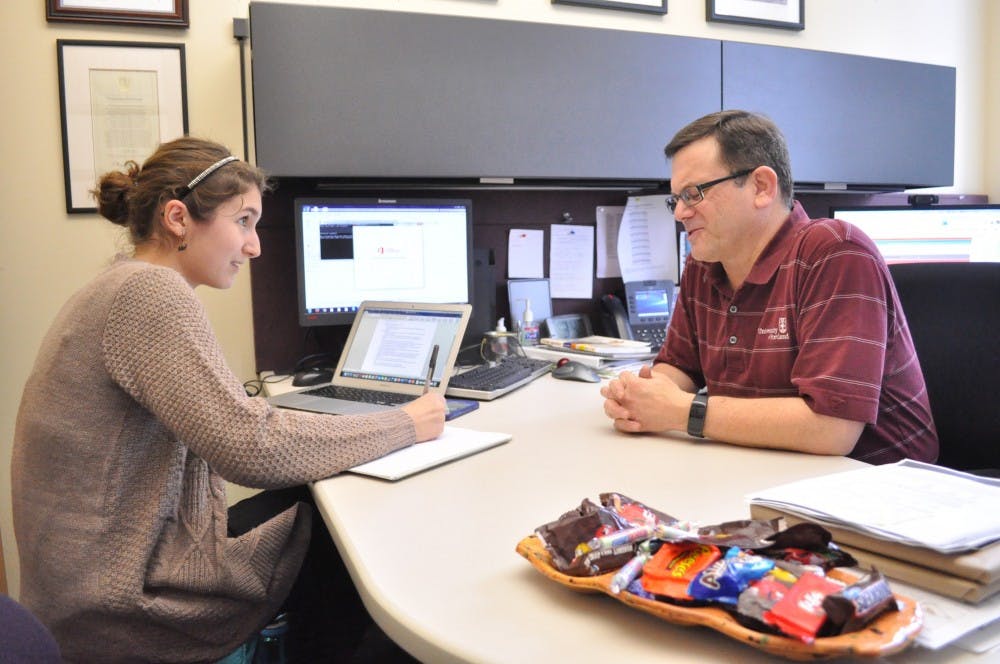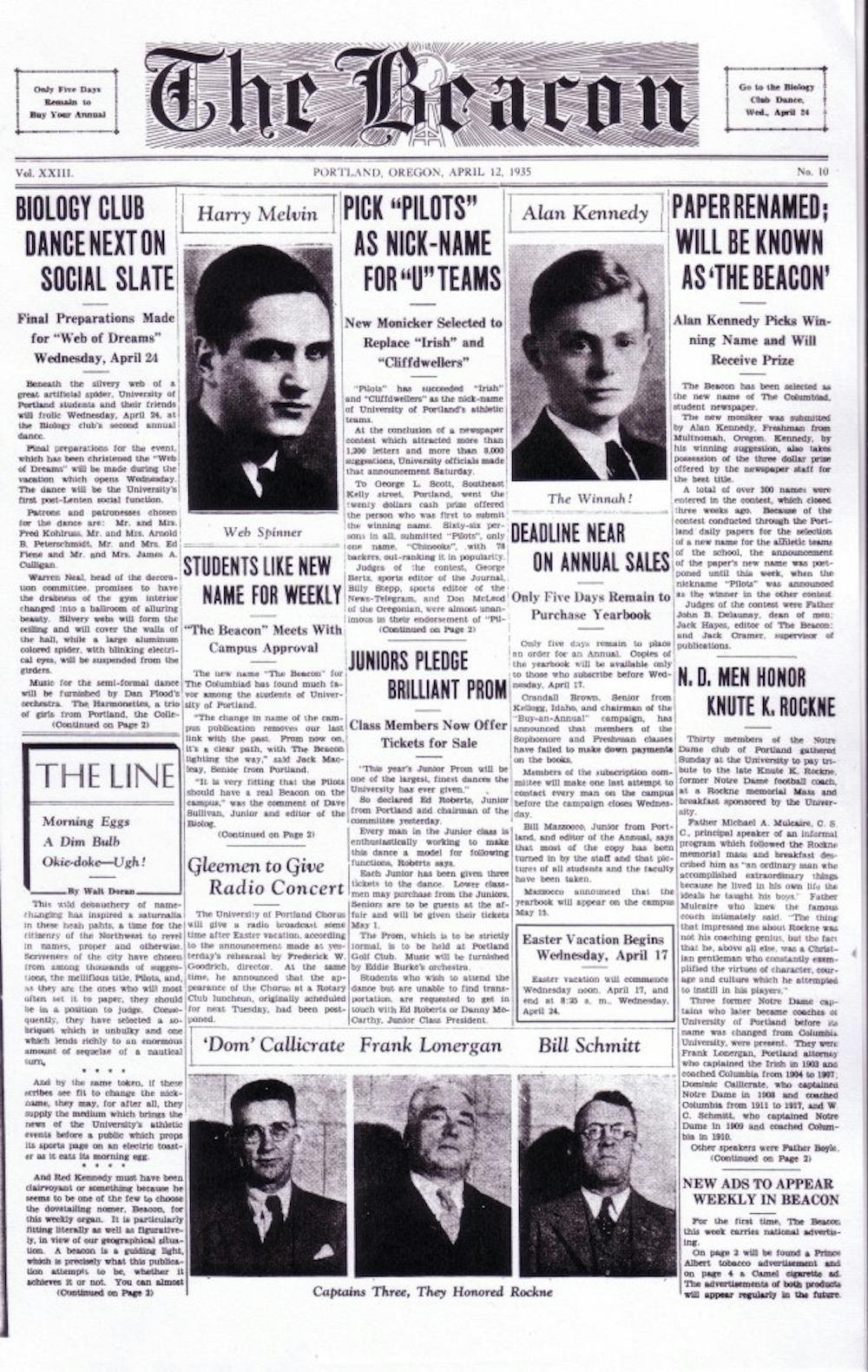Beacon Policies & Procedures

Corrections Policy
The Beacon publishes corrections of significant errors of fact. All requests for corrections must be submitted in writing here.
The Beacon does not remove content unless it is inaccurate and/or it endangers a person's safety and/or causes irreparable serious harm. The editor-in-chief makes the final determination on altering and removing content.
Members of The Beacon staff who do not take appropriate steps to correct significant errors of fact they are aware of are subject to disciplinary action.
Anti-discrimination Policy
We are committed to creating an environment that which all individuals are treated with respect and human dignity. Discrimination in terms of race, sex, gender identification, sexual orientation, national origin, native language, religion, age, disability, marital status, citizenship, or any unlawful basis is not permitted at The Beacon. Violations of this policy by any staff member while working on The Beacon may result in disciplinary action or termination.
Ethics Policy

All Beacon staff are expected to adhere to the Code of Ethics of the Society of Professional Journalists (SPJ). This code is compatible with the motto of the University of Portland:
Veritas vos Liberabit ("The truth will set us free.")
Members of the Society of Professional Journalists believe that public enlightenment is the forerunner of justice and the foundation of democracy. Ethical journalism strives to ensure the free exchange of information that is accurate, fair and thorough. An ethical journalist acts with integrity.
The Society declares these four principles as the foundation of ethical journalism and encourages their use in its practice by all people in all media.
Seek the truth and report it- Ethical journalism should be accurate and fair. Journalists should be honest and courageous in gathering, reporting and interpreting information.
Minimize harm- Ethical journalism treats sources, subjects, colleagues and members of the public as human beings deserving of respect.
Act Independently- The highest and primary obligation of ethical journalism is to serve the public.
Be accountable and transparent:- Ethical journalism means taking responsibility for one’s work and explaining one’s decisions to the public.
Click here to read the entire SPJ Code of Ethics and its position papers.

Interview Policies and Practices
We publicly post these policies and practices to be transparent and to allay concerns of anyone who is asked for an interview for The Beacon.
Our only agenda is to be accurate, thorough and fair.
If we contact you for an interview, know that your point-of-view is important in making sure the story is thorough, accurate and fair.
We know you have a busy schedule, and will try to accommodate you.
As fulltime students and campus journalists just trying to do our jobs, we hope you will also accommodate us. Most stories are time-sensitive, and Beacon reporters have deadlines.
Please respond to our interview requests promptly and make a sincere attempt to be available for an interview in a reasonable time frame.
Email interviews?
Interviews should be in person, by phone or video conference, not via email or text.
UP is a small community, and we think it’s reasonable to expect to converse face-to-face. Most of the time, we will ask to speak with you in person or, occasionally, by phone. We may follow up with additional questions or request clarification via email, but generally do not use email interviews for most stories because they limit authentic conversation and context. There are exceptions: Email interviews may be appropriate for sources who provide complex technical, numerical or legal details for certain stories. Email exchanges may also be adequate for obtaining basic facts for news briefs on a simple event or announcement.
If The Beacon publishes a quote from an email, the story will say it came from an email.
We record our interviews for accuracy’s sake, in addition to taking notes.
A person in a face-to-face interview has a right to request we not record the audio. However, we encourage interview subjects to allow recording (and even make their own recording) to ensure accuracy and avoid misunderstanding later.
We are happy to send you some – but not necessarily all – questions in advance.
We are not interested in ambushing anyone. However, an interview is a conversation that sometimes evokes further unanticipated questions. While we are happy to tell you the general focus of the story and send you a reasonable sampling of questions to help you prepare for the interview, we reserve the right to ask additional questions.
Anonymous sources policy
Use of anonymous sources should be rare.
The Beacon owes it to its readers to be transparent about information and fully identify sources in stories so that readers can evaluate the veracity of the information for themselves. That is why it is Beacon policy to not use anonymous sources except when there is no other feasible way to cover a significant story relevant to the UP community.
The Beacon editor-in-chief, who has the sole authority to grant anonymity to a source, should make that determination after consulting with the reporter, section editor and adviser. If anonymity is granted, the story will explain why anonymity was granted. The Beacon routinely grants anonymity to victims of sexual assault (unless they ask to be identified) and others in a similarly vulnerable position. For context on The Beacon’s policy regarding anonymous sources, click here.
Off-the-record policy
During an interview with a Beacon reporter, all information expressed is considered to be on-the-record unless the source asks that it be off-the-record before or during the interview. We cannot promise to honor such requests after the interview is over.
Reading a story for approval before publication
The Beacon does not fulfill requests to view a story, a reporter’s notes or Beacon photos before publication, as doing so violates best practices in journalism. However, reporters may take the initiative to double-check facts and quotes with a source.
Requesting a correction
Let us know right away if something is inaccurate. Please submit your correction request in writing using this form.
Finally…
As student journalists, we are doing our best, learning on the job, and ask for your patience. We may be more nervous about the interview than you are!
Story ideas and tips
The Beacon encourages the UP community to submit story ideas and tips at this link. We do not guarantee we will pursue every idea submitted.
While ideas can be submitted anonymously, key sources for the story will ultimately have to speak on-the-record, with exceptions made for certain individuals (ie: crime victims and other exceptions to the Beacon's policy on anonymous sources.)
Opinion Submission Policy
The Beacon welcomes a free and *respectful exchange of ideas and encourages all in the UP community and its alumni to submit written commentary.
Letters to the Editor generally do not exceed 250 words. Those with longer opinions are encouraged to submit guest columns. Recommended length for guest columns is approximately 1,200 words.
The Beacon reserves the right to edit any contributions for length or style, and/or reject them for any reason without notification. The Beacon editor-in-chief has the final say in all publication decisions.
- WHO ARE YOU? All contributions must include the writer’s address, email address and phone number for verification purposes. University students must include their major and year in school.
- PHOTO REQUIRED: All contributions must include a photo of the author for the main photo.
- GROUP SUBMISSIONS:The Beacon does not accept submissions from a group unless the writer(s) are listed individually.
- FACTS MATTER. While opinions are subjective, any information a writer presents as fact to support a position should be verifiable. Specifically, we ask writers to provide url links to attribute such information whenever possible, especially statistics.
Here is an example of how links appear as colored hyperlinks in a published piece.If you do not know how to make hyperlinks, please provide the url link next to the "fact" it supports or explains in the body of your piece. Beacon editors will make it a hyperlink, if needed.
- TONE MATTERS. The Beacon is committed to maintaining an atmosphere of respectful and responsible discussion.Don't be snide.
- ANONYMOUS SUBMISSIONS: It is The Beacon's policy to not publish anonymous submissions. There may be rare occasions when anonymity is appropriate. It will be up to the Beacon editor-in-chief to make that determination.
- The Beacon’s receipt of a submission does not guarantee publication.
BOTTOM LINE: Keep it classy, respectful and professional. This is our digital living room. No profanity, inflammatory name-calling or cheap shots. Do unto others, etc.
Click here to write and submit your letter or column.
These policies were unanimously approved and adapted by The Beacon Editorial Board in April 2018.
Editorial Board
The Beacon editorial board is made up of the:
- editor-in-chief (contact: BeaconEditor@UPBeacon.com)
- news and managing editor
- multimedia editor
- living editor
- sports editor
- opinion editor
- community engagement editor
- diversity, equity & inclusion editor
- copy editor/senior reporter
The editor-in-chief, who is appointed by the president of the University of Portland based on recommendations from the Presidential Advisory Committee on Student Media, appoints all editorial board members.
All Beacon editorials represent the opinions of the majority of the Editorial Board, not that of the entire Beacon staff or the University of Portland.
Beacon Editing Procedure
- Reporter submits first draft of story.
- Section Editor (News, Living, Sports) reviews story and sends it back to reporter for additional reporting and/or revisions
- Reporter submits revised draft to Section Editor for review and additional revision, if necessary.
- Section Editor sends story to Editor-in-Chief, who either sends it back to the section editor and reporter for further revisions and/or reporting -OR- submits it to the copy editor.
- After Copy Editor edits the story for content, AP Style, grammar, spelling, punctuation, syntax, etc, it goes back to the editor-in-chief for a final look.
- Following final approval from editor-in-chief, section editor posts the story online.
Throughout the process, the student media adviser is available to coach and advise as needed.
Role of student media adviser
The student media adviser is a university employee who trains and advises Beacon staff on best practices in journalism and ethics, provides professional development opportunities for The Beacon staff, and helps ensure institutional continuity amidst student staffing changes, due to graduation, studies abroad, etc.
The student editor-in-chief, who is appointed by the University president on the recommendation of the Presidential Advisory Committee on Student Media, makes final publishing decisions and is ultimately responsible for all Beacon content. For more context on the role of the adviser and best practices in student media, see the College Media Association’s Code of Ethical Behavior.
Governing document of student media at UP: The UP STUDENT MEDIA GUIDE

The first issue of The Beacon, April 1935
CONTACT US: BeaconEditor@UPBeacon.com



